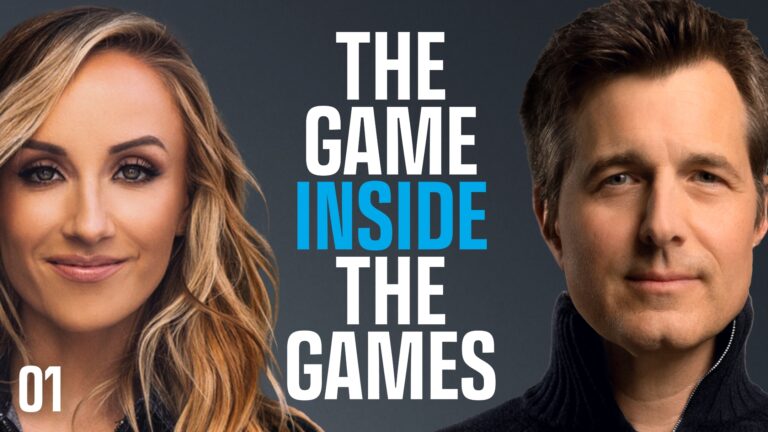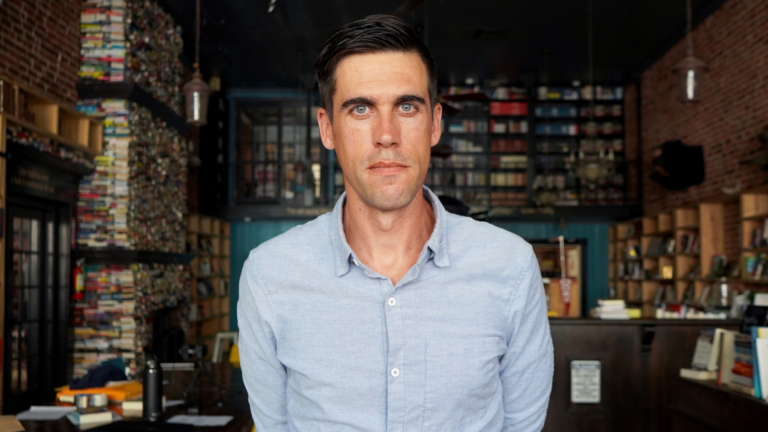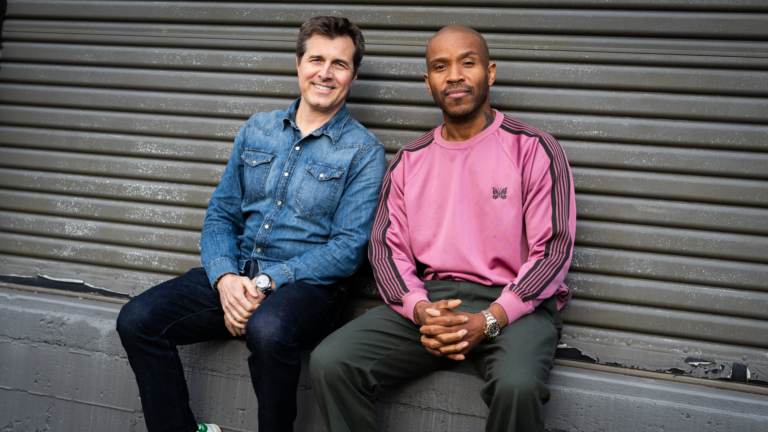This week’s conversation is with Daniel Pink, the author of New York Times bestsellers A Whole New Mind, Drive, To Sell Is Human, and When. His books have sold millions of copies, been translated into forty-two languages, and have helped readers and organizations around the world rethink how they live and operate.
And Daniel has a new book out – The Power of Regret: How Looking Backwards Moves Us – about the transforming power of our least understood yet potentially most valuable emotion: regret.
In writing this book, Daniel spent three years examining decades of research and analyzing his own study consisting of over 16,000 individual responses on the science of regret.
Dan is the real deal, he BRINGS it during this conversation, and I can’t wait for you to learn from his insights. You won’t “regret” it.
“Regret is a ubiquitous and unpleasant emotion. Why? Because it’s useful, because it’s adaptive. Because if we treat it right, it is actually transformative.”
In This Episode:
Where does he get his drive?
Part of it really is just the desire to do good work. I mean it’s the idea like … I like to work hard on the projects that I carry out and I work hard enough on them that I believe in them. Then when it’s time to spread the word about them, because of that belief, I want to go out and not leave … I know that you can handle a sports metaphor, but my wife only allows me one a day, but I don’t want to leave anything on the sidelines. So I think that’s really what it is.
Agency and regret
Regret as an emotion requires agency. Agency is a necessary part of regret, that regret without agency isn’t regret. Regret without agency is disappointment. It’s circumstance. Now what’s interesting is that I was very interested in this question. And so, as part of the research for this book, I did my own very large public opinion survey of the US population, where we had a very rigorous, large sample, 4,489 Americans. We weighted the sample so that it represented the United States and all of its beautiful diversity. We asked people a bunch of questions about regret, but embedded in there were two questions. One of them went exactly at the question of agency, although we actually used an even more incendiary phrase. We said freewill. I said, “Do you believe, in general, that people have freewill, that is that they have some control over their lives?” We found overwhelming majorities of people, Americans, said they have freewill.
Why write a book on regret?
I think largely because I had some. Part of that is a proxy for questions about who we are and how we fit in. I think we answer that question differently at different moments in our life. This is a book… There’s no way I would’ve written a book about regret when I was in my 30s. I didn’t have enough mileage on me. But in my 50s, it felt inevitable because I had room to look back, but I also, knock wood, had room to look forward. And so, I think it was for me the passage of time and having a little distance to look back on, and when I look back, there were regrets. There were things that I wish I had done differently. They weren’t debilitating regrets, but they were thoughts that made me feel bad.
Sharing our regrets with others
One of the things that you see in a lot of the research on disclosure, which ends up being an important component of regret, is that when we disclose our mistakes and our vulnerabilities, we fear that people will think less of us, but that’s often not the case. I mean we have a lot of research on this. They often think more of us. The reason I think is that sense of connection and that sense of affinity.
“Positive” emotions
I love positive emotions. I want other people to have positive emotions. You should have more positive emotions than negative emotions. There’s no question about that. But the idea that you should have only positive emotions is ludicrous. I mean it’s ludicrous because it goes against what the science tells us about who human beings are. It’s also ineffective. This is the point I’m trying to make in this book is that what you have is you have this emotion of regret. It hurts, it’s not a positive emotion, and yet it’s ubiquitous. It is arguably one of the most common negative emotion we have. It’s one of the most common emotions of any kind that we have. There is a wide swath of evidence showing that nearly everybody experiences it. So what’s going on here? This is a riddle. It’s ubiquitous and it’s unpleasant. Why? Because it’s useful, because it’s adaptive. Because if we treat it right, it is actually transformative.
Using regret as a tool
The idea that everybody somehow needs a counselor because they experience negative emotions in their life is actually not helpful. It’s not giving people the adaptive skills. What we want to do is we want to think about our regrets. We want to use negative emotions as signals, as information, as data, receive them, and then have a systematic way to use them as tools to get better.
How religion copes with negative emotions
What we also have is we have religious traditions that actually do a better job of helping us deal with negative emotions. Catholicism has confession and repentance, Judaism has a day set aside in the calendar to atone for your sins, and even other kinds of negative emotions. Think about something like grief, our religious traditions, every religious tradition, has a way to help people manage this horrible, negative emotion of grief. But I think that in the broader secular society, it’s escaped our attention. We haven’t given people systematic ways to deal with negative emotions. Again, it’s not that hard, but it has to be systematic. If you look at religious traditions or AA, they are systematic. It’s a series of practices. It’s a series of rituals. It’s a series of steps. We just need to create those, for negative emotions, for those of us who are not addicts and/or believers.
Boldness regrets
So we have people in this database of now 19,000 who say, “I had a chance to study abroad when I was in college, but I didn’t do it. Now I really regret it.” So that’s an education regret. Then we have people who say, “Ugh,” a lot of people, a lot, who say, “X years ago, there was a man or woman who I really liked. I wanted to ask him or her out on a date, but I was too chicken and I didn’t do it, and I’ve regretted ever since.” Romance regret. Then we have, again, a lot, “I stayed in this crappy lackluster job. What I really wanted to do was start a business, but I didn’t have the guts to do that, and now I regret it.” Okay, that’s a career regret. But to my mind, those are all the same regret. It’s a regret that says if only I taken the chance. You’re at a juncture in your life, you can play it safe, you can take the chance. I found over and over again, not in every single circumstance but in many, in most, people regret not taking the chance. That’s a boldness regret.
Foundation regrets
“If only I’d done the work.” These are people who make small decisions early that accumulate to bad consequences later on. “I spent too much and saved too little,” “I didn’t take care of my health.” Outside of the United States, huge numbers of regrets about smoking, for instance. A surprising number of regrets, more than I would’ve expected, about people who, “Ugh, if only I’d worked harder in school.” That is at the time they didn’t realize they should have been working harder and trying to learn more. They felt like they blew it and it put them on a bad trajectory.
Moral Regrets
“If only I’d done the right thing.” We talked about this earlier, about bullying. We have a lot of regrets about marital infidelity, a lot of regrets about hurting and cheating other people. Small category, but deeply felt.
Connection Regrets
“If only I’d reached out.” These are regrets about relationships, especially non-romantic relationships, where you have a relationship, it should have been intact, or it was intact, and it comes apart usually in undramatic ways, it just drifts apart, and people want to reach out. They don’t because they think it’s going to be awkward. They think the other side’s not going to care. So it drifts apart even more. People feel bad about that, and sometimes it’s too late.
Downward counterfactual thinking
Regret is a form of counterfactual thinking. You’re right, counterfactual thinking has peril to it, but it also has some power to it. Again, it’s a tribute to how powerful our minds and our brains are, that we can conjure events that run counter to the actual facts. Well, there are two big categories of counterfactual thinking. There’s downward counterfactual thinking and upward counterfactual thinking. Downward counterfactual thinking, I like to call that at leasts. Those are at leasts. So this is how you imagine things could have been worse. And so, again, you go back to the database, we have a lot of people at leasting their certain kinds of regrets. “I shouldn’t have married that idiot, but at least I have these two great kids.” At least or one reason why in some famous research, you see in the Olympics, bronze medalists are happier than silver medalists, because bronze medalists say, “Ah, at least I got a medal unlike that schmo who finished fourth.” So they’re happy. And so, here’s the thing about at least, downward counterfactuals. They make us feel better. No question about it. They make us feel better.
Upward counterfactuals
Those are the “if onlys.” This silver medal is saying, “If only I had kicked a little harder in that final 25 meters of that butterfly, I’d have been a gold medalist.” If onlys make us feel worse, but done right, they make us do better. At least they make us feel better, but they don’t improve us. If onlys make us feel worse and can make us do better. In fact, they make us do better in part by making us feel worse. You’ve got to have both the pain leads to the instruction. Now to your other point, we are fabulous in that we can conjure things that are preposterous. That’s why it’s really important to interrogate your regrets.
We need to improve our self-talk
One of the things that you see … And it’s probably even more true, you would know better than I, of high performers rather than mediocre performers, is that when we talk to ourselves in the face of mistakes and screw-ups, we’re brutal, that our self-talk is cruel… The solution there is relatively straightforward, which is don’t do that. Look at the work on self-compassion from Kristin Neff at Texas. What it tells us is treat yourself with kindness rather than contempt. Recognize that your mistakes are part of the human condition, that they’re a moment in your life and not the full definition of your life. So that’s how you reframe it internally.
Distance yourself from yourself
We tend to be terrible at solving our own problems, but decent at solving other people’s problems. So what you want to do is you want to do some self-distancing. And so, it’s goofy things like talking to yourself in the third person. So what should Dan do, not what should I do? It’s things like … We’ve heard of these things before. It’s things like Andy Grove’s technique where he’s trying to make a decision when he was the CEO of Intel and he wasn’t sure what to do. He says, “What would my successor do?” Zoom out, think about it from another perspective. I’m a big fan of placing a phone “call to the you of 10 years from now.” I can make a very strong bet, I think, what the me of 2032 is going to care about, and it’s not most things. The me of 2032 isn’t going to give a shit about most things, but he’s going to care deeply about certain things. And so, make decisions so that the me of 2032 doesn’t have words with me. The single best decision-making heuristic I know is you’re trying to make a decision, what would you tell your best friend to do? And so, what you want to do is reframe internally, treat yourself with kindness rather than contempt. Go outward, disclose it, make sense of it through language, and then get some self-distancing and extract a lesson from it.



